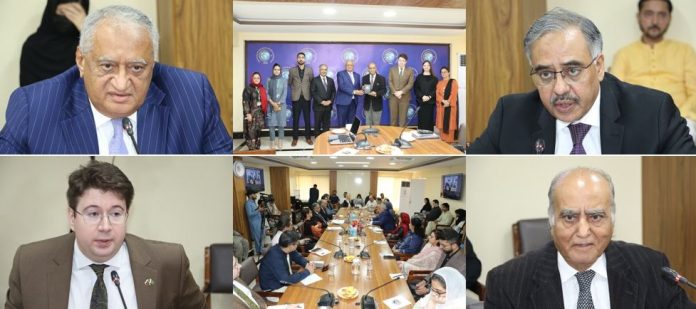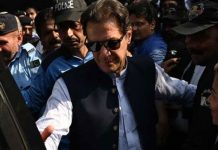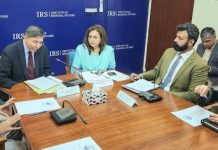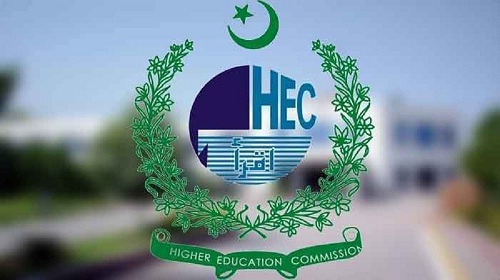ISLAMABAD, OCT 12 /DNA/ – The ISSI hosted a Round Table Discussion on “Pakistan-Russia Relations Amid Changing Global World Order,” with Pakistan’s former Ambassador to Russia Qazi Khalilullah. The event, moderated by Dr. Neelum Nigar, Director Centre for Strategic Perspectives (CSP), was attended by representatives from the Russian Embassy, academics, think-tank experts, and practitioners.
DG ISSI Ambassador Sohail Mahmood warmly welcomed the distinguished participants, expressing his profound gratitude to Ambassador Qazi Khalilullah as the keynote speaker. He highlighted Ambassador Qazi’s extensive diplomatic career, which included key postings in Cuba, Myanmar, and the Russian Federation. With decades of experience in the region, Ambassador Qazi has significantly contributed to the growth of Pakistan-Russia relations, particularly during his tenure as Ambassador in Moscow.
Ambassador Sohail Mahmood noted that Pakistan-Russia relations have passed through many phases — from the earliest day of the cold war to the present times – evolving into a relationship now marked by friendship, mutual understanding, and trust. He stressed that this is a growing partnership encompassing diverse domains, including trade, energy, security, culture, and people-to-people exchanges, with vast opportunities for future collaboration, particularly in the fields of agriculture, aviation, and regional connectivity.
Ambassador Sohail Mahmood also remarked on the significance of the efforts of Pakistan and Russia for the stabilization of Afghanistan and for enhanced regional connectivity. He appreciated Russia’s support for Pakistan’s full membership in the Shanghai Cooperation Organization (SCO) and its supportive stance toward Pakistan’s quest for membership of BRICS. Both countries share a commitment to multilateralism, with the UN playing a central role. He emphasized that Pakistan and Russia are united in their desire to avoid another Cold War, given the contemporary world’s challenges in the wake of accentuation of traditional and non-traditional security threats.
During his discourse, Ambassador Qazi Khalilullah provided a detailed account of the current state of Pakistan-Russia relations, highlighting how the relationship has evolved from the Cold War years of the 1980s to the present phase of mutual friendship. He explained that the Russian economy began transforming with the introduction of Perestroika and Glasnost in the 1990s, transitioning towards a market-based system. Following the disintegration of the Soviet Union in 1991, a fresh start was made in Pakistan-Russia relations, laying the groundwork for qualitatively enhanced cooperation and progress.
A significant breakthrough occurred in 2014 with the signing of the Defence Cooperation Agreement, followed by a gas pipeline agreement in 2015. Ambassador Qazi noted that regular dialogues on various issues of bilateral interest have since taken place, including arms control, counterterrorism, and defence cooperation. He emphasized that Pakistan currently enjoys a peaceful, cooperative, and trustworthy relationship with Russia, free from any demands on either side.
In September 2024, the first-ever Pakistan-Russia Trade Forum was held, resulting in the signing of a Barter Trade Agreement between the two countries. This development, along with Russia’s important role in Pakistan’s foreign policy considerations, underscores the deepening ties. He also highlighted the upcoming visit of the Russian Prime Minister to Pakistan for the SCO Summit in Islamabad, stressing Russia’s continued importance in Pakistan’s diplomatic and economic strategies.
Ambassador Qazi also spoke on the significance of SCO as a vital regional platform. However, he suggested the need for the appointment of special envoys by each member country to focus on connectivity and development, which could enhance the effectiveness and coordination of the organization’s efforts.
There was an interactive session afterwards, which covered topics related to diplomatic ties, trade, education, military cooperation, and regional connectivity. Participants emphasized the need for stronger academic exchanges and people-to-people contacts, noting the growing number of Pakistani students in Russia. The discussion also highlighted joint military exercises as critical to counterterrorism efforts. It also covered issues such as the Ukraine war and energy collaboration. The dialogue reaffirmed Pakistan’s balanced foreign policy, maintaining strong relations with both Russia and the United States.
Ambassador Khalid Mahmood, Chairman, BoG, ISSI, closed the roundtable by delivering his vote of thanks, reaffirming the commitment of ISSI to fostering strategic dialogue and collaboration. He noted the promising trajectory of Pakistan-Russia relations, underscoring the importance of adding substance to this partnership through enhanced integration, connectivity, trade, and commerce. He highlighted recent progress in high-level contacts as essential for fostering deeper ties.

















